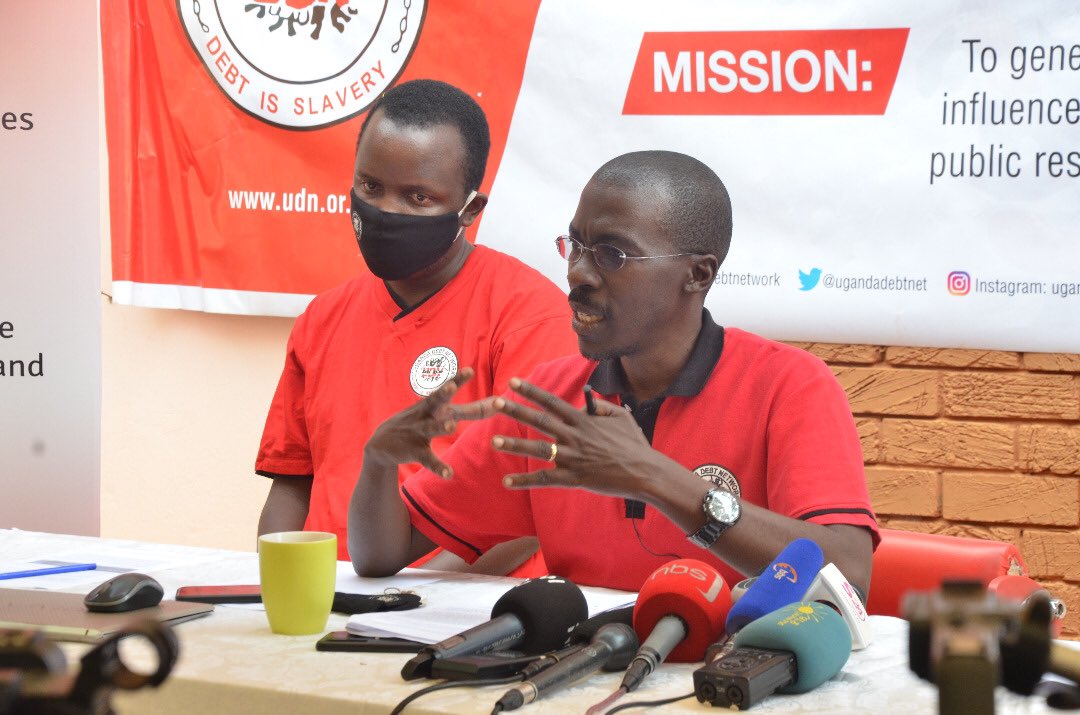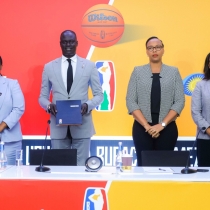
Activists call on Uganda’s foreign creditors to cancel debt to free up cash for economic recovery
The Uganda Debt Network (UDN) wants foreign lenders to cancel the debt Uganda owes them so that the East African nation can channel the funds used in servicing debts to development projects.
Uganda has over the years borrowed billions of dollars from economic giants like China, Germany, and U.K. and organizations like the African Development Bank, World Bank and Islamic Development Bank to help with the financing of projects in different sectors.
But a number of factors, including misuse of funds, have made it quite challenging to repay these loans and the outbreak of the Covid-19 pandemic has aggravated the situation.
According to the ministry of finance, planning and economic development, Uganda’s external debt stock increased by 14 percent from $7.66 billion as of December 31, 2018 to $8.75 billion as of December 31, 2019. Domestic debt stock increased by 21 percent from $3.86 billion to $4.74 billion for the same period.
At a Sunday press conference held in Ntinda, Kampala, UDN members noted that Low-Income Countries (LICs), of which Uganda is among – are facing a myriad of challenges in the social protection strategies and economic outlook due to the downturn from Covid-19.
That being said, they recommended that all debts lent to LICs be canceled and that these countries be given a 10-year action of no-interest on new debts.
“The two-fold approaches would consign the LICs into more public expenditure investments tagged to protecting the rights and social protection of the citizens, economic recovery, improved healthcare and others,” the members said.
“Uganda Debt Network implores the IMF, WBG and G.20 (world’s richest countries) during 2020 to coordinate such a compelling broad global participation of all global actors to this two-fold approach to revival of economies of the LICs, including Uganda.”
To make a case for the call, UDN says on top of calamities like floods, floating islands, desert locusts, landslides and mudslides that have recently struck Uganda, the Covid-19 calamity alone has seen Uganda’s abject poverty levels elevate from the prior 21% to a projection of 25% between January and August 2020, with over 2.6 million people likely to slip into poverty by December 2020.
“Numerally, this will add onto the 8 million poor people at pre-Covid-19 time; thus, totaling up to nearly 11 million people (out of a total of 43 million) in 2020 alone, even higher if vulnerability numbers (due to job loss, shrunk salaries and wages, excess production capacity of firms) were to be included,” reads a statement from the Network.
Between January and August, Uganda acquired about 16 loans acquired to counter the effects of the pandemic and for other interventions in the economy. Those loans exclude the grants and supplementary budgets at end of FY2019/20.
With that in mind, the Network argues, canceling debts in the only viable option to help LICs shore up their economies.
“The above state of affairs is what is generally presented across the LICs, while increasing inequalities and social unrest that oftentimes disproportionately affect the vulnerable poor, especially the youths and women, across the 6 East African Community States (Uganda, Rwanda, Burundi, Tanzania, Kenya, South Sudan) and Africa at large,” it says.
“While transparency and accountability of the respective Governments and State machinery especially in Africa remain highly wanting and infested with marauding run-away corruption and abuse of public resources led by the political class, a Debt cancelation move remains most viable for healthcare and economic recovery over the short-term, medium-term and long-term in the greater call for social justice in the COVID-19 contextual outfit.”
What is a country’s debt? According to UDN, any country’s debt is that which a county owes to other governments, MFIs and the private sector- both domestic and foreign. That said, UDN contends that other forms of public debt should not be forgotten or pretended about, including iv) Recoverable Debt (e.g. owed to oil and gas prospecting commercial companies) v) Undisbursed Debt vi) Land compensations by Government vii) extent of Contingent liabilities.
In Uganda, debt repayment remains a key constraint to comfortable fiscal space and liquidity positions. Uganda, for instance, paid $42.8 million (including $4,488 i.e. nearly $5 million interest payment) between January and December 2019 as external debt servicing alone.
This translated into an approximate Shs160 billion off estimated Shs19 trillion domestic revenues under the Shs40 trillion total national budget for fiscal period 2019/20.
The repayments were to organizations like AfDB, Asian Development Bank, Inter-American Development Bank, IMF and World Bank, and countries like Austria, China, Germany, Japan, France, Kuwait, Saudi Arabia, UK, Belgium, Germany and UK.
Uganda allocates more funds to debt servicing than to the budget for healthcare, social development and agricultural sectors.

Earlier this year, junior finance minister David Bahati noted that borrowing in most Sub-Saharan African countries is inevitable due to lack of domestic resources.
“Many of the governments across the Sub Saharan African region are grappling with integration of their National Development Plans with the delivery of the Sustainable Development Goals (SDGs) agenda,” he explained.
“The resources required to meet these obligations are not readily available from the domestically generated revenues, thus calling for acquisition of external financing. This has therefore brought on the challenges of maintaining macro-economic stability and fiscal sustainably whilst meeting the development goals.”
Links
- 224 views











































Join the conversation